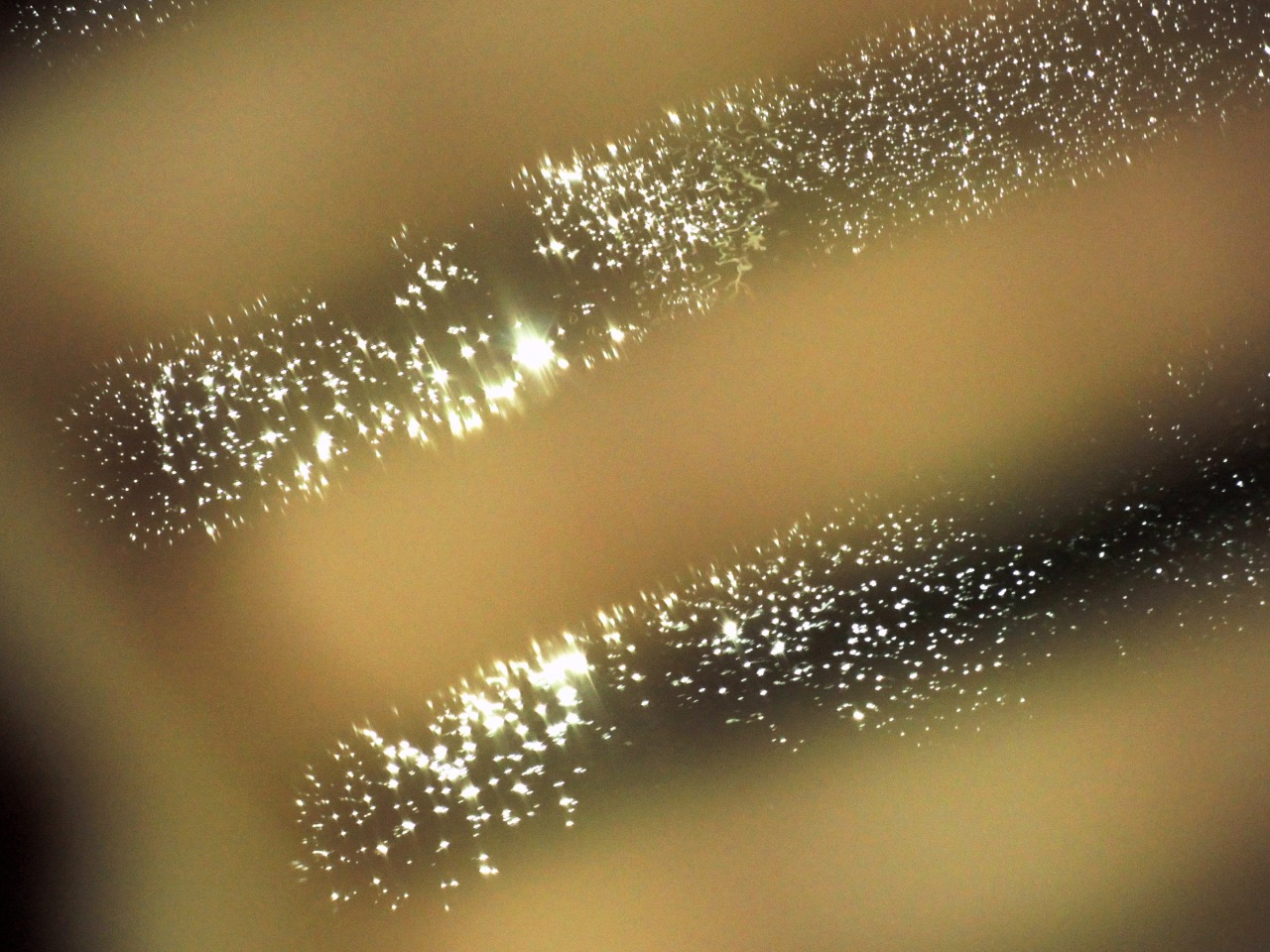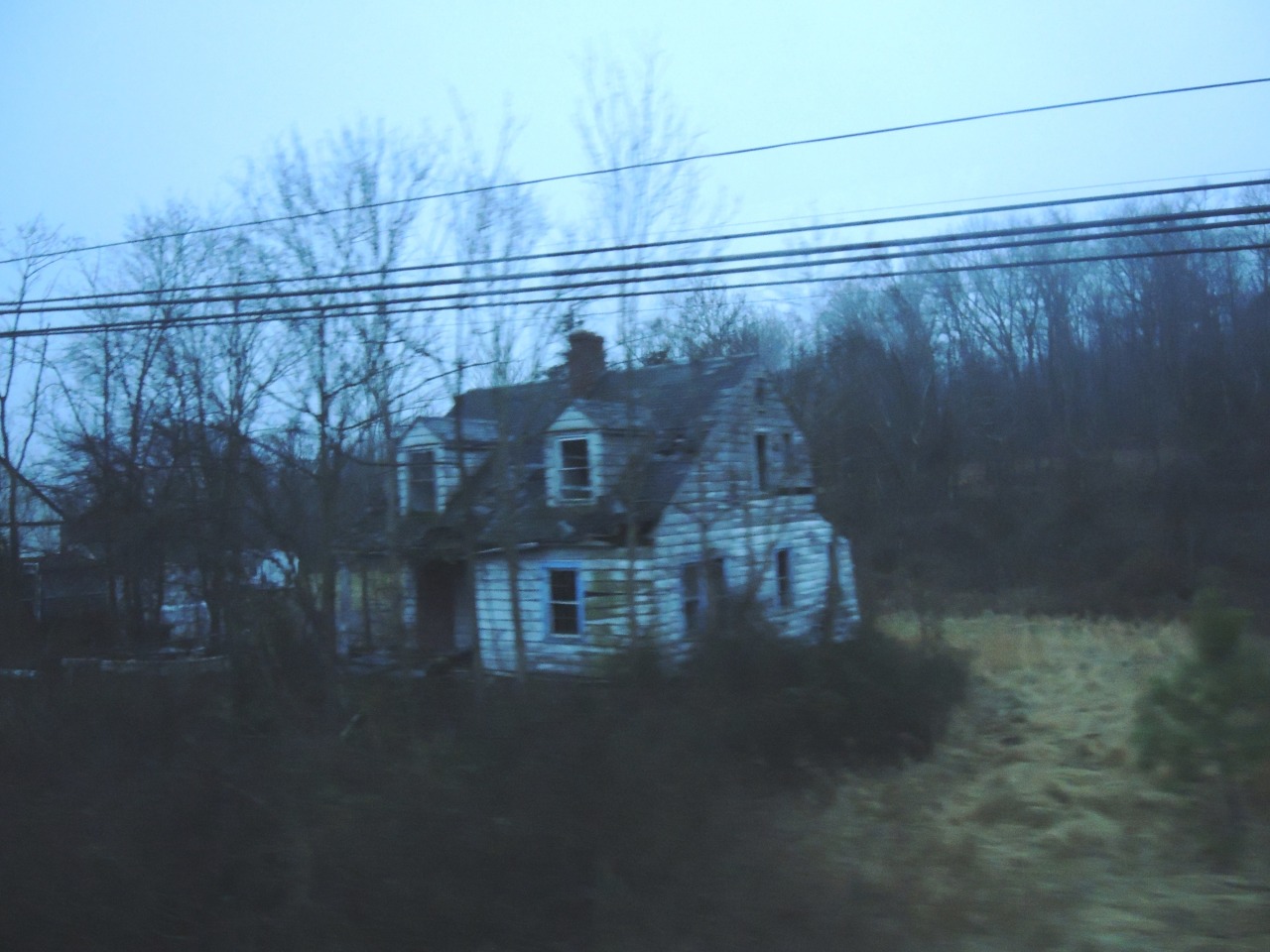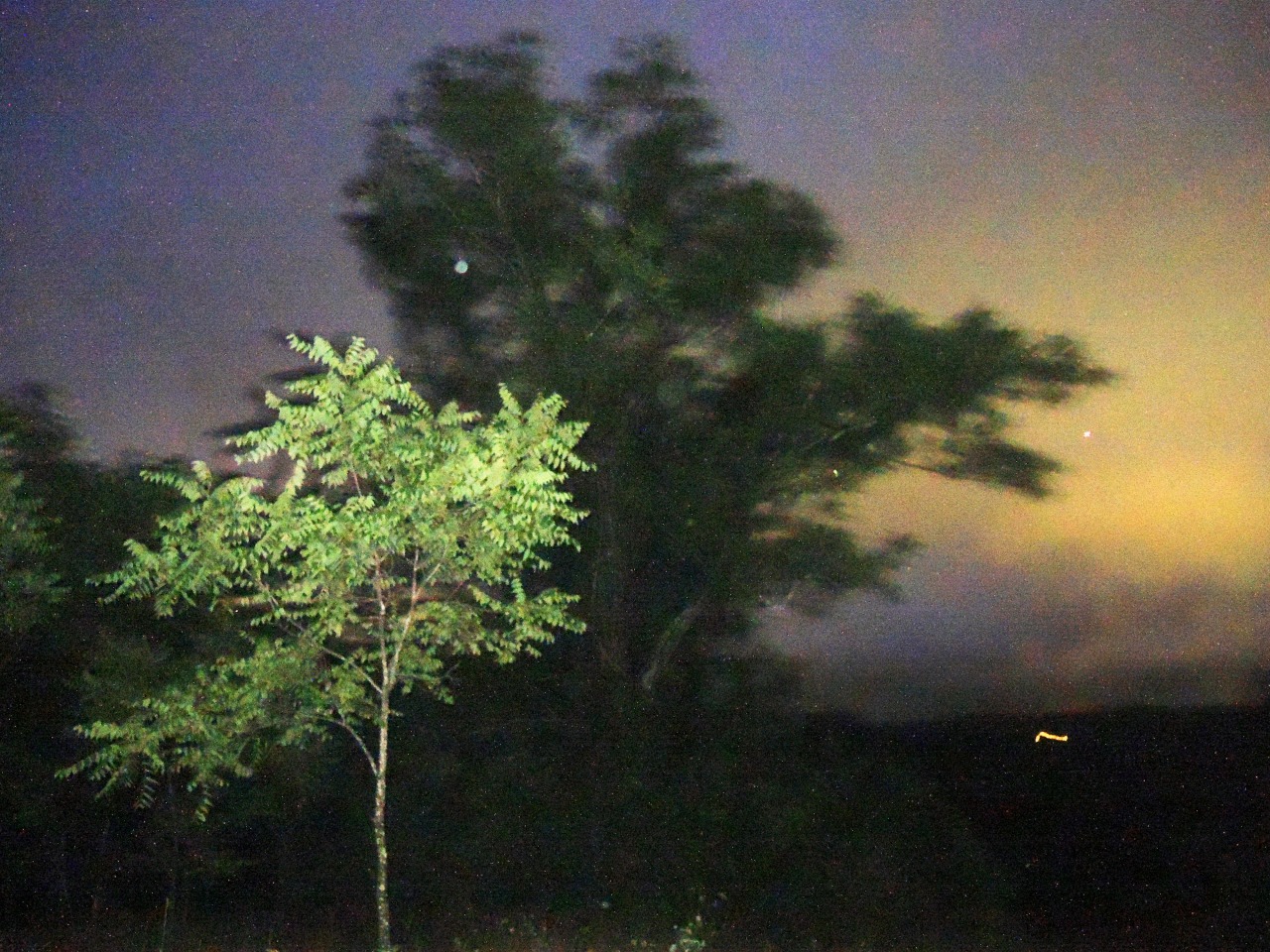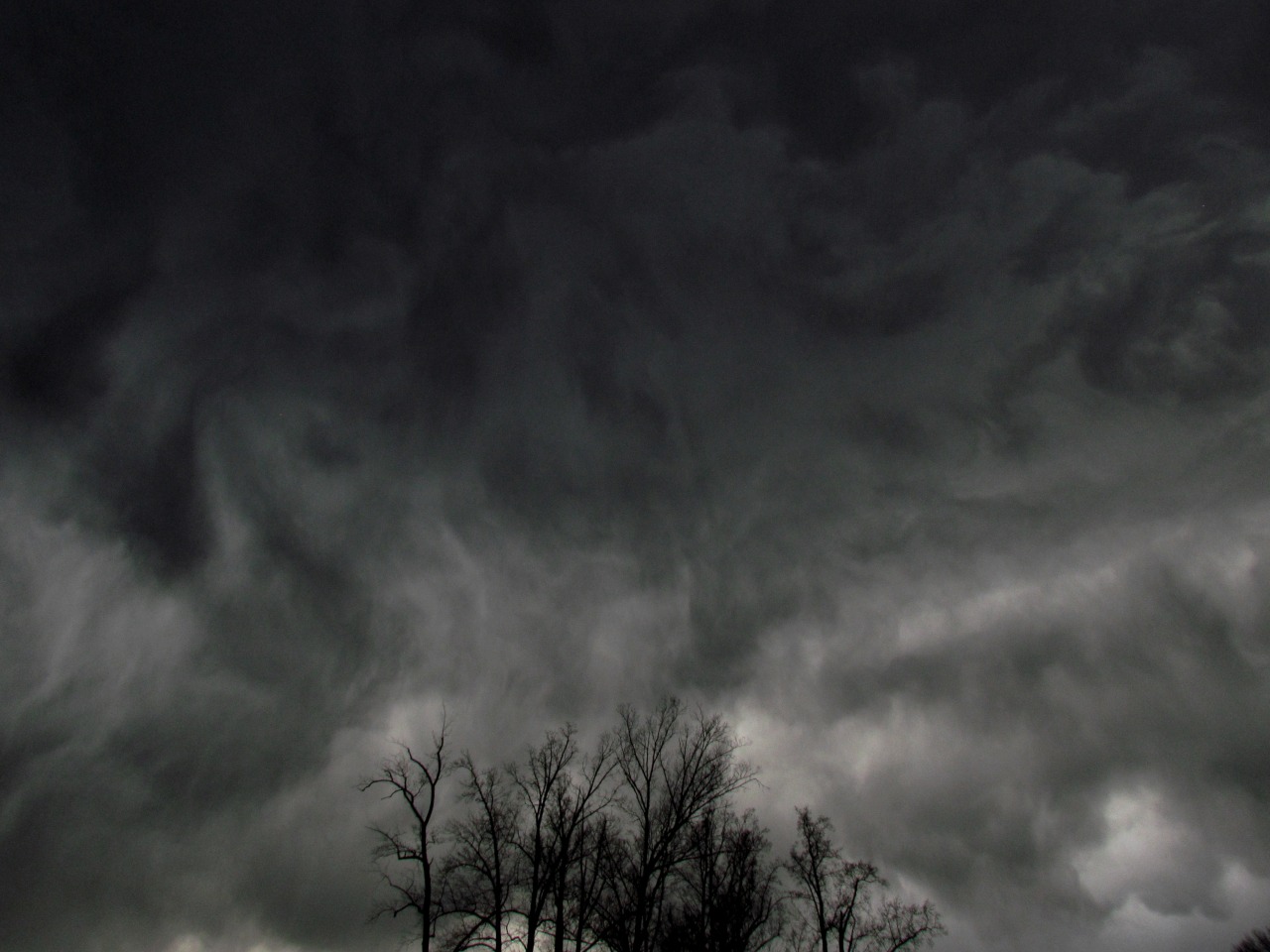
Maxwell Johnson, 'Clouds in My Mind, #6.'
A loud thump woke him. He was instantly alert.
Waking was usually a slow process of gathering his thoughts and sensations, as if consciousness were a gas diffused throughout his body or out in the room which waking drew back inside, like inhaling sweet smoke that coalesced around a tight point of awareness. This time the noise knocked him back into himself, with no transition.
At once he doubted if the thump had been real or only the climax of a dream. It was morning, not long after dawn, he guessed. He glanced at the clock beside the bed and saw that the electricity was still out from the storm that was roaring and flashing when he went to bed. Thunderstorms in winter were rare. He had sat late with his book before the lamp died, hearing rain blow against the windows and wind scratch at the corners. When he went to bed, groping his way up the stairs and under the blankets, the room was pale for a moment, as if carved from ivory, in a flash of lightning. Now, cloudy, gray light came through the windows and stroked the old wallpaper, cracked in places, mostly clear of pictures or furniture, like a room in a monastery. The thump had not been thunder, and there had been more than the sound. As if hit by something large and hard and moving fast, the entire house had shaken. He felt an echo in his nervous system, a violent tremble that had come up through the floor and the legs of the bed.
It looked deserted, but he recognized the woman standing beside the open door.
Could a car have rammed the house?
It wasn't likely. He dressed, went downstairs and looked out a window at the small, unpaved side road. A car would have to cross a broad bit of yard and avoid a few trees to hit the house from that direction, though it would be possible. There was no sign of an accident on the road or tread marks on the grass. A larger, busier road was on the other side of the house, but from there a car would have to break a guardrail and plow through a ditch to reach him. He checked anyway. Nothing. Hardly any traffic, this early on a Sunday. Or a heavy branch falling on the house from one of the trees in the back? They were close enough, and the storm had been powerful.
He pulled on a sweater and shoes, went outside and walked around the house. Some shingles had blown off and the gutters were clogged with leaves, but just as they had before the storm. There was a scattering of twigs and one heavy limb was in the driveway, but not enough to make the impact he’d felt, even if it landed on the roof. He dragged it off the asphalt. The propane tank? It might have exploded, for some reason, but there it was, just fine.
Perhaps the noise and the tremor had been a dream, after all. It was warm, warm for February. There’d been a couple of inches of snow at New Year's Day that hadn't lasted. Now the ground was barren. Brown grass and skirts of wet leaves around the trees, dull red around the maples, dull gold around the walnuts. He looked at the sky, layers of slate cloud thinning to show intervals of blue. A breeze that touched his hair seemed as live as a hand.
Back in the kitchen he drank a glass of water at the sink. Should he drive to the gas station for coffee? The electricity might be working in some places. It’d be a long bleary morning without caffeine.

Maxwell Johnson, 'Don't Be Afraid, #2'.
At the end of the driveway he swung onto the side road taking him past farms, woodlots, DNR hunting and fishing areas. This was a longer route to the gas station, winding through a maze of gravel roads, but he took it when he could. He didn't like the highway. This way he might see a deer in the fields or a heron rising from the river.
On the road a single turkey buzzard swivelled its peeled pink head at his approach, lifting off its roadkill, shabby wings laboring sidewise and then off the ground, like a tent of tattered canvas blown loose from its moorings. In the rearview mirror he saw the buzzard circling back to finish its meal, a skunk.
He drove past the DNR parking area for hunters, which was empty with no hunting season open this late in the winter, and began to see the broken trees. The destruction, which must have been part of the storm the night before, wasn't everywhere but came in clearly defined swathes, as if microbursts or compact twisters had moved with stealth through the woods. The mature trees seemed to have withstood the wind, but saplings as thick as a thigh were snapped off a few feet above ground, the broken wood white and wet in the cloudy light.
He drove over the low concrete bridge where people often sat on lawn chairs and fished over the side in good weather and where he was used to seeing herons or the occasional egret in their seasons. Warm as it was today, no one was fishing. The water was low and green with algae, even after the storm.
As he was driving, he heard the loud crack of a tree’s branches giving away, somewhere around him, then moments later he saw it, thrashing out from the neighboring trees, landing in front of him and now blocking the road, its upper branches lying in brush and weeds on the other side. He got out onto the gravel and grasped a sturdy branch. It wouldn't budge, this healthy oak, not hollow, all its wood appearing sound. He had to go back. He wondered how many other trees that were still standing had been weakened by the wind and might fall?

Maxwell Johnson, 'Driving Up to DC'.
He reversed the car, seesawing back and forth on the one lane, and went back the way he had come. He knew the roads. He turned onto another dirt lane, made a few more turns, and was at the gas station. It looked deserted, but he recognized the woman standing beside the open door. He didn't know her name, but he had seen her working there. He parked beside a pickup.
“Good morning.”
“ 'Morning,” she said, glancing nervously up at the sky. It was still early but things were now clear in the kind of clean, yellowish light that sometimes comes just before a rainstorm in summer. New clouds were gathering.
The woman was smoking, which she probably wasn't allowed to do inside. She pinched the cigarette and took a swift drag, as if not wanting it too close for too long, then exhaled. Heavy and young and tired, she had rusty blond hair over brown roots and a gold ring thin as wire on one side of her nose.
“You have electricity?”
“A generator,” she said. He could hear it purring around a corner. “Just works inside though. Doesn't run the pumps. Sorry, if you needed gas.”
“No, just coffee.”
“We got that.”
He started in. The glass door was propped open with a thin, wooden wedge. She spoke again, stopping him.
“What's happening, mister?” she asked, as if he might know. “Power's been out since midnight. You seen any crews working?”
He didn't want to go behind the counter and work the register himself, but he didn't know anything else to do.
“They'll be around, I guess. Nothing to worry about. Did you hear that wind last night? The lines must be down in a lot of places.”
“Yeah, I guess.” She looked at the sky again and sucked at her cigarette quickly.
“A tree about fell on my car, just a minute ago. On my way here,” he said.
She looked frightened.
“Where was that? Did you come down from La Fontaine?” She named the nearest town, her voice close to panic.
“No, back that way,” he gestured vaguely in the direction of his house. “Toward the dam.”
She nodded.
“Just thinking about my kid, you know?” She dropped the cigarette and ground the fire out with the heel of her shoe. “I had to leave her asleep and come to work. My mom’s supposed to be there but she's not answering her phone.”
“I bet she'll be fine.”
“Yeah, sure. Probably. Go on in. Sorry. I'll be in. In a minute.”
Under the bright lights inside the store he poured two large cups of coffee, thinking that even if the second were cold when he got to it, it’d be better than nothing. He looked in the glass case where there were usually fresh doughnuts in the morning. Empty.
He stepped to the door to tell her he was ready to pay. She was gone. The pickup was gone, too. There was still an odor of cigarette smoke around the door.

Maxwell Johnson, 'Distant Glow'.
He left five dollars beside the cash register, more than the coffee would cost. He didn't want to go behind the counter and work the register himself. It felt wrong, leaving the store unattended and vulnerable, but he didn't know what else to do. Even if he had wanted to call someone and let them know she had deserted her post, he had no idea who to call. And he felt himself vaguely on her side, whatever that meant.
He drove slowly home, or toward home, sipping his coffee, taking detours that prolonged the drive, past small white houses at the edges of fields of stubble where farmers had harvested corn in the fall and by other fields lying fallow in goldenrod and thistle. There weren't many houses, not a lot of people lived out this way. They must feel isolated, he thought, this morning with no electricity.
The sky darkened, as if for more rain. Clouds were stacking themselves in different shades of slate and coal, like ancient sedimentary layers of exposed rock, but still the odd, yellow light persisted close to the ground, clinging to the stubble in the fields, making it gleam. Long thin puddles between rows shone and reflected the sky, like little flaws in nature that opened into another world. A dirty fog had risen and hovered a few feet above the soil.
Driving by a soybean field on one side and a DNR protected wetland on the other, he thought he spotted deer coming out of the trees and stopped. He’d had close calls before. But these bulky shapes moving out of the fog were too big to be deer. With surprise just shy of astonishment, he saw that they were elk. As far as he had ever known, there were no elk here. Not within hundreds of miles.
A bull elk in the road turned to face him, a few feet from the front of the car. He had never seen anything as big as this stag. It was bigger than buildings, bigger than machines. If he had stood beside it, he would have been as tall as its shoulders. The stag’s thick neck lifted its head taller than that, and its antlers branched and grew out like a tree or like, how could you describe it — like ramifying, fractal columns of fantastic bronze coral. It stared at him through the windshield, the most beautiful thing he had ever known. All muscle and bone, blood and breath, strength, speed, and intelligence. His chest hurt.

Maxwell Johnson, 'The Glorious Above, #3.'
The stag did not flinch when the door clicked, but it seemed to tense and lower its stance minutely, its ears flicking, as if bothered by a fly. The man stood watching, and the other elk, twenty or twenty-five of them, left the trees and crossed the road behind the stag, cows and half-grown yearlings and immature males.
He stepped forward, dazed, raising his hand to touch the stag's muzzle, which looked as soft as silk, the gesture like pulling back a curtain in front of a picture. The elk lowered its head and swung its antlers, easy, a casual shrug, and knocked the man off his feet. He fell backward, onto the front of the car. Something snapped in his side. Like an inanimate thing, not trying to catch himself, he slid off the car and sat upright in the road.
The stag turned and followed the herd, trotting gently to get back to the front. He slumped against the car. A mosquito whined around his ear. His mouth was wet. He rubbed it with the back of his hand and it came away bloody. He wondered how far the elk had traveled to get here, where he had never seen elk before, and where they were going. Was there anywhere for them to go?
The earth shook. Far to the left, in the sector of sky above the woods where the elk must have walked all night and now into the day, lightning licked and crackled.

JAMES OWENS answers
THE WILD CULTUE SCRIBBLER'S QUESTIONNAIRE
1 What is your first memory and what does it tell you about your life at that time and your life at this time?
My first memory is of sitting at the edge of the road outside our house (a “red-dog road,” which means one covered roughly with the ash and clinkers left behind in the process of turning coal into coke), sifting sand through my fingers and watching it fall and gleam in the sunlight I was waiting for my father to come home from his job in the mine. The memory describes a certain kind of solitude in my life at the time. And now, I think it means I've not gotten far past that point.
2 Can you name a handful of artists in your field, or other fields, who have influenced you — who come to mind immediately?
I've mostly written poetry, so my primary center of gravity is with Seamus Heaney and other Northern Irish poets of the 60s and 70s. It was reading their work that first brought me into the presence of the idea that poetry, and then other types of writing, might be a thing to practice in real, everyday life. I responded, especially in Heaney, to the combination of rural background with a serious dedication to the traditions and craft of poetry. There were lots of other places that I might have discovered something similar, but, for me, it just happened to be those Irish poets.
3 Where did you grow up, and did that place and your experience of it help form your sense about place and the environment in general?
I grew up in southwest Virginia, in Appalachian coal country, and I think that had everything to do with my sense of place and environment. It was, and mostly still is, a beautiful landscape desecrated by industry, inhabited by a beautiful people scarred by the same industry. The years of my youth there were a time of change. This relatively isolated and behind-the-times culture was absorbed into the bland mainstream, and then the mines failed and former miners left — with little to show for years of battering the hillsides and waterways. We all grew up there with a sharp feel for the reciprocity of the human impact on nature and nature's response.
4 If you were going away on a very long journey and you could only take four books — one poetry, one fiction, one non-fiction, one literary criticism — what would they be?
Poetry: Heaney's Selected Poems, 1988–2013. Fiction: Anna Karenina, by Tolstoy, because all of life is in it. Non-fiction: Annie Dillard's Pilgrim at Tinker Creek. Literary criticism: Real Presences, by George Steiner.
5 What was your most keen interest between the ages of 10 and 12?
Science fiction. Obsessive, all-consuming, a book per day, at least.
6 At what point did you discover your ability with poetry?
In my early twenties. I didn't write much of the moody, depressive poetry that many teens seem to produce, though that's not to say that the poems I eventually got around to writing were any better for the first few years.
7 Do you have an ‘engine’ that drives your artistic practice, and if so, can you comment on it?
If I have such an engine, for a long time it was inward, having something to do with concealment, some desire for self-erasure: to disappear into the poem or story and forget myself. Now that has changed. I'm very concerned with the way language and the world interact, without having very much interest in myself as (the explicit or hidden) subject. I want to know what poetry, fiction, translation, criticism can and/or should preserve, as this civilization darkens and dissolves around us and in us.
8 If you were to meet a person who seriously wants to do work in your field — someone who admires and resonates with the type of work you do, and they clearly have real talent — and they asked you for some general advice, what would that be?
Don't stop. Seriously. It is hard to write or make any kind of art, and stopping is easy and attractive. Don't stop. When you think you can't write, put one word after another, until you come to the end of that sentence. Go to the next one.
9 Do you have a current question or preoccupation that you could share with us?
As above, I guess. What can be saved? Should it be? Why?
10 What does the term ‘wild culture’ mean to you?
It is the paradox where we all live, these animal bodies and the animal substrata of the mind, nervously not quite fitting into the joinery of these nested lacquer boxes we've made out of history. It is the pleasure we take in these same remainders and disjunctions.

JAMES OWENS' most recent collection of poems is Mortalia (FutureCycle Press, 2015). His poems, stories, and translations appear in various literary journals, including recent and upcoming publications in Waxwing, Adirondack Review, Fourth River, The Honest Ulsterman, and Southword. He grew up in Virginia and now lives in a small town in northern Ontario on the north shore of Lake Huron.
MAXWELL JOHNSON is a young photographer whose work can be seen here. Their photographs were used previously to illustrate the first publication in these pages of the poems of Amelia Williams and Jan Beatty.

Add new comment